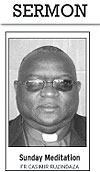When Napoleon Bonaparte was asked about the source of his strong intuition, he responded: “…before entering an undertaking, I meditate for a long time and foresee what might occur. It is not genius which reveals to me suddenly and secretly what I should do in circumstances unexpected by others; it is thought and preparation.” Most students of literature know that these were the principles which guided this great man’s life: thought and preparation.


When Napoleon Bonaparte was asked about the source of his strong intuition, he responded: "…before entering an undertaking, I meditate for a long time and foresee what might occur.
It is not genius which reveals to me suddenly and secretly what I should do in circumstances unexpected by others; it is thought and preparation.” Most students of literature know that these were the principles which guided this great man’s life: thought and preparation.
Far from being only a lesson in literature, and without going into the moral assessment, it is a lesson in humanity: we should all strive to lead a life guided by principles as well as meditate. In fact an unmeditated life is not worth living.
According to many psychologists, whether aware or not, we all have some principles that guide our life in the choices we make. Most of us may not even know what they are; but they are so ingrained in our beliefs that we can easily make a list of them if we give it a thought.
A principle is different from a rule. The former internally motivates us to do the things that seem good and right to us.
We develop them by ourselves or we learn them from people or situations after seeing their benefits in our life. Rules on the other hand externally compel us, through force, threat or punishment, to do the things deemed good or right. And they are made for us to observe.
As we continue to plan ahead for the year 2010 we should keep in mind that life must be meditated on and guided by certain principles. Life itself works on its own principle.
It responds by corresponding to how we have decided it to be. Life is what you make it! One philosopher Soren Kierkegaard puts it in another way: life can only be understood backwards with constant stock-taking and meditation; but it must be lived forwards by continually applying lessons and principles acquired in the past.
In fact living by principles necessarily requires a constant mindfulness and critical assessment of situations as they arise in order to discover which principles are applicable to different situations and to what extent.
Without that careful consideration, some principles turn into rules. There are some guidelines which may help to formulate our life guiding principles.
We may consider such values as integrity, respect for people’s right to a healthy existence, care for our environment and concern for our communities just to mention a few.
In her Sunday liturgy, the church gives us the example of Jesus’ life and how he maintained a strict sketch of his goal, the means he would use to attain it and the main principle of action as well as the timing. We find this in Luke 4: 21 – 30, where Jesus is in the synagogue in Nazareth, where he was born and he reads the scripture as was the custom.
Since he was about to start his preaching mission, he chose the text of Prophet Isaiah, which in fact was the manifesto of his own life. He red aloud: "The Spirit of the Lord is on me, because he has anointed me to preach good news to the poor.
He has sent me to proclaim freedom for the prisoners and recovery of sight for the blind, to release the oppressed, and to proclaim the year of the Lord’s favor.” Then he said: "Today this scripture is fulfilled in your hearing.”
With this inaugural discourse for his mission, he gives the sketch of his goal as to preach good news to the poor, to help the prisoners, the oppressed, and to give sight to the blind.
As the only son of the Father and in his person and action, he makes everything promised by the Father present and actual in the "now” of today. His concern was not just his immediate listeners, but for every person in every age that hears and obeys his word in faith.
From the outset we see the life of Jesus as a life which is very well organized, a life which has been meditated for a very long time, and with clear guiding principles to follow. That is why no forces would divert Jesus from his walk of life. He had a manifesto to follow.
All this leaves us with a big question to answer. As we move through this year 2010, do we have a personal manifesto to follow?
Do we have a set of principles which we wish to follow as guidelines for our life? Or we are to follow whatever moves! In this case, not to plan is planning to fail.
Ends


